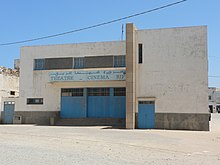Cinema of Morocco
| Cinema of Morocco | |
|---|---|

Cinema Rif Essaouira
|
|
| Number of screens | 68 (2011) |
| • Per capita | 0.2 per 100,000 (2011) |
| Main distributors |
Megarama Magreb Modern Films Younes |
| Produced feature films (2011) | |
| Fictional | 23 |
| Animated | - |
| Documentary | 1 |
| Number of admissions (2012) | |
| Total | 2,011,294 |
| • Per capita | 0.08 (2010) |
| National films | 681,341 (33.8%) |
| Gross box office (2012) | |
| Total | MAD 69.2 million |
| National films | MAD 19.3 million (27.8%) |
The cinema of Morocco refers to the film industry in Morocco.
Cinema in Morocco has a long history, stretching back over a century to the filming of Le chevrier Marocain ("The Moroccan Goatherd") by Louis Lumière in 1897. Between that time and 1944, many foreign movies were shot in the country, especially in the Ouarzazate area.
In 1944, the Moroccan Cinematographic Center (CCM), the nation's film regulatory body, was established. Studios were also opened in Rabat.
In 1952, Orson Welles' Othello won the Palme d'Or at the Cannes Film Festival under the Moroccan flag. However, the Festival's musicians did not play the Moroccan national anthem, as no one in attendance knew what it was.
Six years later, Mohammed Ousfour would create the first Moroccan movie, Le fils maudit ("The Damned Son").
In 1968, the first Mediterranean Film Festival was held in Tangier. In its current incarnation, the event is held in Tetouan.
This was followed in 1982 with the first national festival of cinema, which was held in Rabat.
In 2001, the first International Film Festival of Marrakech (FIFM) was also held in Marrakech.
Morocco has known a first generation of directors in the 70s-90s. They participated to the development of film industry in Morocco. Notable film makers are Hamid Bénani (Wechma, Traces, 1970), Souheil Ben Barka (Les Mille et une Mains, 1974), Moumen Smihi (El Chergui ou le Silence violent, 1975), Ahmed El Maânouni (Alyam, Alyam, 1978 ; Transes (Al Hal), 1981; Les Cœurs brûlés, 2007), Jilali Ferhati (Poupées de roseau, 1981 ; La Plage des enfants perdus, 1991), Mustapha Derkaoui (Les Beaux Jours de Shéhérazade, 1982) ; Farida Benlyazd (Une porte sur le ciel, 1988), Saâd Chraïbi (Chronique d'une vie normale, 1990), Mohamed Abderrahmane Tazi (Badis, 1989 ; À la recherche du mari de ma femme, 1993), Abdelkader Lagtaâ (Un amour à Casablanca, 1992 ; La Porte close, 1998), Hakim Noury (Le Marteau et l'Enclume, 1990), Hassan Benjelloun (La Fête des autres, 1990)
...
Wikipedia
